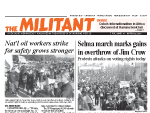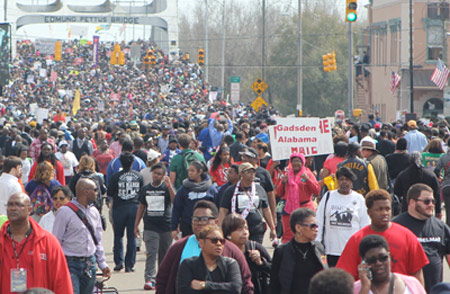SELMA, Ala. — The streets of this small city were filled to overflowing March 7 and 8 as tens of thousands of workers, young people, veterans of the mass proletarian movement to overthrow Jim Crow segregation and others from around the country gathered to commemorate the 50th anniversary of the civil rights battle here to demand voting rights for Blacks that culminated in the 1965 march to Montgomery, Alabama’s capital.
Along with the Battle of Birmingham two years earlier, where Rev. Fred Shuttlesworth led thousands of youth into the streets in the face of the police dogs and water cannons of Eugene “Bull” Conner, the Selma protests were pivotal battles in the victorious struggle to overthrow Jim Crow segregation in the South. The Birmingham battle ushered in a new stage in the fight for Black rights, drawing tens of thousands of industrial workers into mass actions. The Selma fight led to the passage of the historic 1965 Voting Rights Act.
Many participants pointed to the profound effects of the overthrow of Jim Crow. And many came to protest current efforts to chip away at voting rights, especially the 2013 U.S. Supreme Court decision that unconstitutionally struck down key provisions of the 1965 act.
On March 7 President Barack Obama, former President George W. Bush, dozens of federal and state legislators and thousands of other took part in official commemorations, including a rally of some 40,000.
The next day some 80,000 people joined veterans of the 1965 protests to march over the Edmund Pettus Bridge — named after an early Ku Klux Klan leader — and return for a rally.
Everyone’s spirits were buoyed by the turnout. The march was made up overwhelmingly of workers, including some organized in union contingents from the United Auto Workers, Teamsters, postal workers’ unions, UNITE HERE, Service Employees International Union and others. Their self-confidence stamped the demonstrations both days.
“I started thinking about coming when my grandson said he wanted to see the movie “Selma.” So I brought him with me this weekend,” said UAW member Cheryl Temple, who works at a truck plant in Gastonia, North Carolina.
“I came today because I believe in civil rights and because workers need unions,” said Temple, who is Caucasian. The factory where she works was the first truck plant in the South to vote in a union. Now there are five truck assembly and parts plants within 50 miles of Gastonia that are organized, she said. The UAW locals there chartered a bus to bring union members to Selma.
Dozens of other buses came from Atlanta, Birmingham and other cities, organized by the NAACP, the Southern Christian Leadership Conference, local churches and community groups, and many other organizations. Also present in large numbers were students and others who have been part of protests against police brutality and killings around the country in recent months.
March organizers aimed to focus on the fight against efforts to chip away at voting rights today. “From voter photo ID, proof of citizenship to register and reduction in voting and voter registration days,” Alabama state Sen. Hank Sanders said when he joined leaders of the SCLC to announce the action in February, “Americans are losing the right to vote, which so many people sacrificed their lives and blood to secure.”
“I was 14 years old in 1965,” said Ruth Anthony, of Selma. “I marched in all three protests at the bridge.”
“The older people wouldn’t march, a lot of them, because they were afraid of losing their jobs,” Anthony said. “My mother worked as a maid and thought she’d be fired if she went to the protests. So I went, me and my friends.
“I didn’t want to see my mother have to step behind little white kids to get waited on, if they came into a store after she did. Things like that we lived with every day. We didn’t want to press our noses against the windows at restaurants we couldn’t get into,” she said.
Some 450 Delta Airlines workers flew in. “It’s so important to be here today,” said Wanda Bell, a flight attendant from Los Angeles. Delta’s 20,000 flight attendants are currently locked in a battle to win union recognition and a contract.
“All workers need unions,” said Jackie Johnson-Avery, 50, who works at the Mercedes Benz auto assembly plant in Vance, Alabama. “You are no one if you try to go up against a multi-million-dollar corporation like Mercedes by yourself. You can’t do it.”
A group of Brotherhood of Maintenance of Way rail union members, now affiliated with the Teamsters, came to Selma from half a dozen cities. “Having more people on a train crew makes the train safer for us on the ground,” said Matt Weaver, a member from Toledo, Ohio, backing rail workers’ growing opposition to train bosses’ efforts to slash the crew size to one.
“We are honoring the picket lines at the struck oil refinery in Toledo,” Weaver added. “We don’t cross.”
Several hundred immigrant workers, most originally from Latin America, came from more than a dozen cities in Alabama, organized by the Alabama Coalition for Immigrant Justice.
The morning of March 9, demonstrators set out on a 54-mile march to Montgomery, to re-enact the 1965 protest. The journey will culminate March 13 with a rally at the state Capitol to press for full reinstatement of the Voting Rights Act.
Related articles:
Report details abuse by authorities in Ferguson
Defeat of Jim Crow milestone for workers
|
Printer-friendly version of this article |















